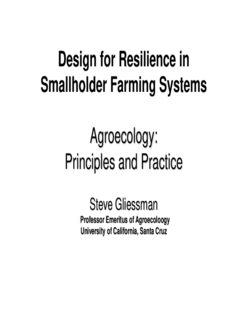
Design for Resilience in Smallholder Farming Systems Agroecology PDF
Preview Design for Resilience in Smallholder Farming Systems Agroecology
Design for Resilience in Smallholder Farming Systems Agroecology: Principles and Practice Steve Gliessman (cid:16)Professor Emeritus of Agroecoloogy University of California, Santa Cruz Agroecology and Small Holder Farming Systems -IAASTD (2007) Ag at the Crossroad and agroecological solutions -UN Rapporteur Right to Food (2011), small holder systems, and agroecology. -FAO Symposium on Agroecology for Food Security and Nutrition (2014) (“opening a window in the cathedral of the green revolution”). Agroecology The application of ecological principles and concepts to the design and management of sustainable agroecosystems. 1. Principles and concepts of ecology 2. Design 3. Management 4. Agroecosystems 5. Sustainability Ecological Concepts and Principles The Ecosystem – a system of interactions between the living and non-living components of the environment The Agroecosystem – an ecosystem with a purpose Agroecosystem Ecosystem Atmosphere Human and rain inputs Atmosphere and rain Animals and their Crops products Carnivorous Herbivorous consumers Primary consumers Producers Consumption Loss and Markets Soil Loss Decomposers Soil Decomposers Loss Loss Loss Loss Energy Nutrients A General Principle The greater the structural and functional similarity of an agroecosystem to the natural ecosystems in its biogeographic region, the greater the likelihood that the agroecosystem will be sustainable.
Description: